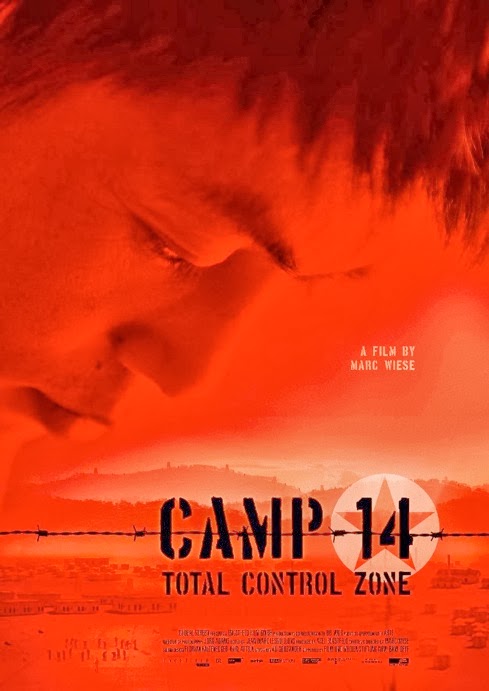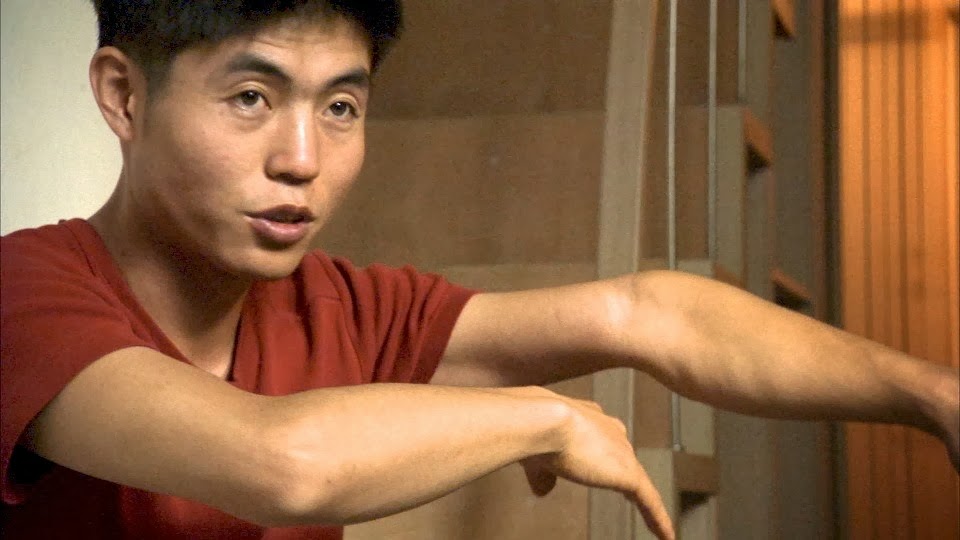
Camp 14: Total Control Zone (Movie, 2012)

OK, trying to get my posting legs again…
Shin Dong-hyuk (born Shin In Guen) was born in a North Korean political prison camp and lived there until he escaped at the age of 23. He eventually made his way to South Korea and the United States. After I posted on Escape from Camp 14 by Blaine Harden I noticed that this documentary was available to view instantly on Netflix. I prefer Harden’s book because it provides much more context, plus it places more emphasis than the film on Shin’s odyssey out of North Korea and his adaptation to a very different world than the prison camp. The documentary touches on these areas but its main focus is on the prison camp itself (as the title reflects). Even with a few issues I had with the film I still recommend it.
There are plenty of reasons to find Shin’s story impactful, not the least is that the prison camps he describes are still operating. In the opening scene Shin notes his hesitancy to talk about his experience, which is consistent with Harden’s observation that Shin wasn’t totally comfortable with his new surroundings but, more importantly, he wasn’t comfortable with himself. Later on there is footage of Shin speaking in front of a conference. Despite opening up with his story, he doesn’t seem to be fully a part of the conference. It almost feels like he is being manipulated or used. Eventually we see Shin talking in front of a church and he is much more natural, speaking without a script. He appears like he *wants* to be doing this. He tells the story of the girl caught with food in her pocket and he goes into detail about her beating and death. His comments in this talk are even more chilling than in the book where he said he felt nothing: “But we believed that this was all right. It was the lawful punishment for theft. Our parents were guilty and we had to suffer for their crimes, too. We didn’t feel sorry for her.” This talk resonates in the same way as the scene at the end of Harden’s book, where the reader feels a sense of hope for Shin at a similar talk.
Shin goes into detail on his brother’s and mother’s plan for escape. Food is a major factor in reporting them (as will be a major factor in wanting to escape). He was upset that his mother had hidden rice from him and fixed it for her brother. “I did what my instinct and the rules required. I reported their plan.” Reporting on his family members is still a sensitive subject. He hesitates when talking about it, with plenty of long pauses and a request to stop the interview. “But it’s all over now. I had to go through a tough time because of this incident. I was very resentful towards my mother and brother at the time. But I try not to think like that any more, because I also got my father into trouble when I fled myself. I think I need a break. I can’t manage any more.” Shin demonstrates an attempt to change the way he thinks. The shame he feels is reflected in his avoidance of eye contact with the interviewer during this section (which may also be a carryover from his time in the prison camp, where prisoners avoided eye contact with guards).
Shin muses that if someone else reported his brother’s and mother’s escape attempt it wouldn’t have been so bad for him and his father. He immediately contradicts himself, though, saying he probably would have been executed for not turning them in. He also notes, and this seems to haunt him, that’s he’s not sure they would have actually gone through with their escape plan. At the end of this section Shin makes a moving plea: “Please translate what I’ve said.” In watching him talk about his role in their execution it’s easy to understand why he lied about it (by omission) for so long.
One of the biggest impacts in the book was Shin’s story about what he had to do to survive. Shin was ashamed of these actions, although the shame comes only after his escape when he has the luxury (and the developing conscience) to do so. His comments remind me of Primo Levi’s comment in If This Is a Man that concentration camp prisoners didn’t feel like criminals because of the absence of all morality in the Lager system.
Shin finds it difficult to answer questions about the torture he suffered, deflecting or avoiding related questions at times. “Although many years have passed, I don’t want to remember these experiences anymore.” The beatings and torture he went through were standard procedure in the prison system. Shin shows his bent arms, which had been straight before he was tortured. In talking about the deformity of his legs and his body Shin notes the shame and anger it causes him. His observation that he can’t participate in common behavior, like wearing shorts because of his scars and deformity, causes deep emotions to surface.
The biggest impact in the movie, though, comes from the interviews with former North Korean prison guards. As one guard put it, “I didn’t feel in the slightest bit guilty, even though I killed so often there. After the execution of a regular criminal, we were given special rations: a bit of meat and two bottles of alcohol. “ He felt it was the right thing to do to protect his country. The most disturbing part of the movie for me was when a guard said he occasionally didn’t feel like killing one of the prisoners. To get the job done he would threaten a group of prisoners, telling them they needed to kill one member of their group or he would kill all of them. Every time he did this the prisoners would beat to death one of their own.
Trailer for Camp 14: Total Control Zone
As much as I liked the movie there were several things that irritated or disappointed me. The most egregious errors come from not identifying anyone in the movie. If they noted them, I completely missed it. It becomes clear the role of the former prison guards, although for one man it took a while for me to feel certain—he sounded like a former North Korean government or prison official for quite a while. There was also no context for footage used from outside of the interview. When was it taken? Where? The footage lets you draw the conclusion that it is taken of a North Korea political prison but it isn’t made clear. Sometimes the footage speaks for itself, sometimes it doesn’t. There are several discrepancies with Harden’s book but all of them are small and may be a result of translation.
To offset the irritations, the inclusion of the interviews with the guards (and I had to read another review to confirm they were both guards) provide some of the most moving parts of the movie. It’s interesting to see how troubled the former prison workers are. In one interview clip the guard shows trepidation about a possibly reunified Korea and possibly meeting people he has tortured. He shows guilt and remorse over what he did and it clearly shakes him even talking about it. “A human life in the camp was worth the same as that of a fly. Nobody ever told me I was wrong for shooting someone. I was praised for it. Everything’s like that in the penal camp for political prisoners. I never wanted to give an interview like this one. … After this interview I’ll never talk about my time in the camp again.” Also impactful are the guards’ comments about some of their other actions, such as taking women prisoners to their quarters for sex or watching a pregnant woman (usually from sex with the guards) strung up and beat to death with a whip.
Even though most of the footage has no context provided it still proves effective at times. Seeing Shin looking at the DMZ through the barricades, referring to North Korea as his home, is very moving. There’s an irony in watching Shin shop in a mega-mart (like a Costco) that contains an abundance of food, knowing that that a major reason for his decision to escape revolved around food. There are animated reenactments of prison life provided, similar to the line drawings provided with the pictures in the book by Blaine Harden. (The line drawings are supposedly similar to the 2007 book Shin had published in South Korea.) I wonder how effective the animation is, though. I find Shin’s struggle with his memory and conscience to be more powerful than explicitly drawing the experiences.
Near the end of the movie, after all has been said about life in the prison camp, Shin’s stated desire to return to the location of Camp 14 when the country is free is a shock. He wants to be a free man and farm there, living off his own work. He’s clearly uncomfortable with South Korea, saying everything there revolves around money. He also notes the high number of suicides in South Korea, a land with plenty of food and clothes, while suicide was rare in the prison camp.
Shin states, “In the camp I had a pure heart.” Considering all he did and saw, that’s quite a jarring statement. He misses the innocence he feels he had in prison, although he doesn’t miss many other things from that time. When Shin says “I miss my innocent heart” we are watching the conflicted development of Shin’s conscience.
A few quotes from the movie:
- Shin: “The outside world was inconceivable to me. I had never seen the world on the other side of the fence. I suspected that there was a country of North Korea and a bigger world, and I thought that world would be exactly like the labour camp. I couldn’t conceive of anything else.” [To be honest, Shin’s life up until his escape is inconceivable to us.]
- Shin on the investigators that interrogated him for a month after he first arrived in South Korea: “These investigators are experts. You can’t tell them any lies. They are perfectly informed. If I’d know about a thumb, they’d know what was under its nails.”
- After his escape from the prison camp: “The first morning in freedom was a big shock. The picture of North Korea that I saw that morning was a big shock for me. I saw people running around freely, talking and laughing. They weren’t under surveillance. … It felt to me like this world was heaven.”
Links
- The IMDb.com page for the documentary
- The movie’s official page
- My notes while watching the movie
